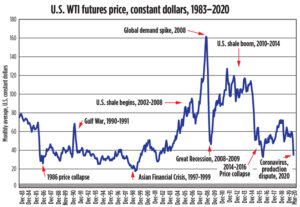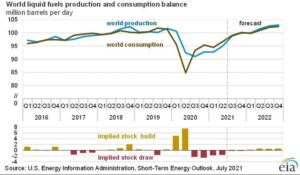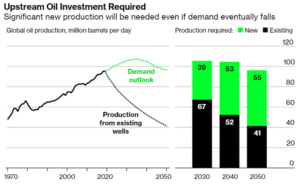“The world’s underinvestment in fossil fuel development since 2014 is leading to an era of scarcity for global oil markets, Halliburton CEO Jeff Miller told the World Petroleum Congress today in Houston.” Read story here.
What happened in 2014, of course, is that crude prices crashed (see graph below) when Saudi Arabia flooded the oil market with excess crude to strangle the U.S. fracking industry, which didn’t work because frackers were able to lower their costs (and also because stupid lenders poured billions into fracking companies that never made a dime).
And then, just as the oil glut began to abate and crude prices began to recover (same graph), along came the pandemic to crush demand (next graph below).
The upshot of all this is that in tandem with falling profits (that became losses), oil companies slashed spending on production (why spend money to produce more oil when you’re losing money and there’s already too much oil?), and then when demand abruptly jumped, the oil wasn’t there. And because crude oil comprises about 60% of the pump price of gasoline, guess what? Pump prices rose in tandem with rising oil prices.
Drivers grew spoiled by low gas prices as the oil glut dragged on, but the cheer at the pump came at the expense of future oil supply. Even back in 2016, the IEA warned at the World Economic Forum that “in a few years of time, when the global demand gets a bit stronger,” we’d see “an upward pressure on the prices as a result of market tightness,” which is exactly what’s happening now as economies emerge from Covid-19 shutdowns and millions of people are traveling again.
It was very predictable, before anyone could have predicted that either Trump or Biden would end up in the White House.
Moreover, higher oil prices (and therefore higher gas prices, because gas stations can’t sell gas at below cost and stay in business) are necessary if consumers are to have the gas they want in the future. They can have cheap gas or enough gas, but not both (next graph below).
All of this is a result of market forces and basic economics, not politics.
On the subject of politics, Biden nixed the Keystone XL pipeline, which would have primarily benefited Canada and had little or no effect on U.S. oil supplies, and most of that oil would have merely transited through the U.S. on the way to being exported anyway (details here). Also, construction would have taken years, so shipping oil through the pipeline lay years in the future, which could have no effect on today’s gas prices. Under Biden, drilling on federal lands has increased (see story here). Biden also has authorized releases from the Strategic Petroleum Reserve, although these can have only minimal effect on supply and prices. Thus, there are no Biden policies anyone can point to that have caused pump prices to rise.
Those increases were baked by the market and economic forces outlined above long before Biden came into office. They would have occurred if Trump had remained in office. Higher oil prices = higher gas prices. That math works in reverse, too. Oil prices have dropped 18% since late October, and given a roughly 6-week lag between crude purchasing and delivery of gas to gas stations, gas prices should be dropping by Christmas. Gas prices won’t go back to their oil glut or pandemic lows, but they’ll come down some.
When they do, what are the odds that Republicans will credit Biden for declining gas prices and lower inflation? All you’ll get from them is silence. Claiming that he is responsible for pump prices is a one-directional lie.

